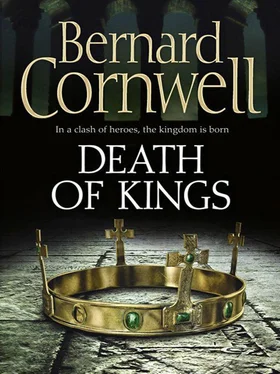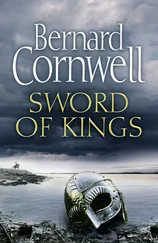They had been as indecisive as us, and now they simply recrossed the river at Cracgelad and went back the way they had come. Steapa’s scouts told us of their retreat, and day by day the reports came that they were heading back towards East Anglia, taking slaves, livestock and plunder. ‘And once they’re back there,’ I told the council, ‘the Northumbrian Danes will go home in their ships. They’ve achieved nothing, except taking a lot of slaves and cattle, but we’ve done nothing either.’
‘King Eohric has broken his treaty,’ Bishop Erkenwald pointed out indignantly, though what use that observation was escaped me.
‘He promised to be at peace with us,’ Edward said.
‘He must be punished, lord King,’ Erkenwald insisted. ‘The treaty was solemnised by the church!’
Edward glanced at me. ‘And if the Northumbrians go home,’ he said, ‘Eohric will be vulnerable.’
‘When they go home, lord King,’ I pointed out. ‘They might wait till spring.’
‘Eohric can’t feed that many,’ Ealdorman Æthelhelm pointed out. ‘They’ll leave his kingdom quickly! Look at the problems we have in feeding an army.’
‘So you’ll invade in winter?’ I asked scornfully. ‘When the rivers are flooding, the rain is falling and we’re wading in freezing mud?’
‘God is on our side!’ Erkenwald declared.
The army had been in Lundene for almost three months now, and the food supplies of the city were running low. There was no enemy at the gates, so more food was constantly being carted into the storehouses, but that took an immense number of wagons, oxen, horses and men. And the warriors themselves were bored. Some blamed the men of Cent for delaying their arrival and, despite my having hanged a man, there were frequent fights in which dozens of men died. Edward’s army was querulous, underemployed and hungry, but Bishop Erkenwald’s indignation at Eohric’s betrayal of a sacred trust somehow invigorated the council and persuaded the king to make a decision. For weeks we had the Danes at our mercy and granted them mercy, but now they had left Wessex the council suddenly discovered courage. ‘We shall follow the enemy,’ Edward announced, ‘take back what they have stolen from us, and revenge ourselves on King Eohric.’
‘If we’re following them,’ I said, looking at Sigelf, ‘we all need horses.’
‘We have horses,’ Edward pointed out.
‘Not all the men of Cent do,’ I said.
Sigelf bridled at that. He was a man, it seemed to me, ready to take offence at the slightest suggestion of criticism, but he knew I was right. The Danes always moved on horseback, and an army slowed by foot soldiers would never catch them or be able to react quickly to an enemy move. Sigelf scowled at me, but resisted the temptation to snap at me, instead he looked to the king. ‘You could lend us horses?’ he asked Edward. ‘What about the horses of the garrison here?’
‘Weohstan won’t like that,’ Edward said unhappily. A man’s horse was one of his most valuable possessions, and not one that was casually lent to a stranger going to war.
No one spoke for a moment, then Sigelf shrugged. ‘Then let a hundred of my men stay here as garrison troops and your, what was his name, Weohstan? He can send a hundred horsemen to replace them.’
And that was how it was decided. Lundene’s garrison would give the army a hundred horsemen and Sigelf’s men would replace them on the walls, and then at last we could march and so next morning the army left Lundene by the Bishop’s Gate and by the Old Gate. We followed the Roman roads north and east, but it could hardly be called a pursuit. Some of the army, those with experience, travelled light, but too many contingents had brought wagons, servants, and too many spare horses, and we were lucky to travel three miles in an hour. Steapa led half the king’s warriors as a vanguard with orders to stay within sight of the army, and he grumbled that he was forced to travel so slowly. Edward had ordered me to stay with the rearguard, but I disobeyed and went far ahead of Steapa’s men. Æthelflaed and her Mercians came with me. ‘I thought your brother insisted you stayed in Lundene?’ I told her.
‘No,’ she said, ‘he ordered me to go to Cirrenceastre.’
‘So why aren’t you obeying him?’
‘I am obeying him,’ she said, ‘but he didn’t tell me which road to take.’ She smiled at me, daring me to send her away.
‘Just stay alive, woman,’ I growled.
‘Yes, lord,’ she said with mocking humility.
I sent my scouts far ahead, but all they discovered were the hoof-prints of the Danish retreat. Nothing, I thought, made sense. The Danes had assembled an army that probably numbered over five thousand men, they had crossed Britain, invaded Wessex, and then done nothing except take plunder. Now they were retreating, but it could hardly have been a profitable summer for them. Alfred’s burhs had done their work by protecting much of Wessex’s wealth, but staving off the Danes was not the same as defeating them. ‘So why didn’t they attack Wintanceaster?’ Æthelflaed asked me.
‘It’s too strong.’
‘So they just walk away?’
‘Too many leaders,’ I said. ‘They’re probably having councils of war just like us. Everyone has a different idea, they talk, and now they’re going home because they can’t make a decision.’
Lundene lies on the border of East Anglia so on our second day we were deep inside Eohric’s territory and Edward released the army to take its revenge. The troops spread out, plundering farmsteads, rounding up cattle and burning villages. Our progress slowed to a crawl, our presence signified by the great pillars of smoke from burning houses. The Danes did nothing. They had retreated far beyond the frontier and we followed them, dropping from the low hills into the wide East Anglian plain. This was a country of damp fields, wide marshes, long dykes and slow rivers, of reeds and wildfowl, of morning mists and eternal mud, of rain and bitter cold winds from the sea. Roads were few and tracks were treacherous. I told Edward time and again to keep the army closed up, but he was eager to ravage Eohric’s land and so the troops spread wider, and my men, still acting as scouts, had a hard time staying in touch with the farthest flung men. The days were shortening, the nights became colder and there were never enough trees to make all the campfires we needed, so instead men used the timber and thatch from captured buildings and at night those fires spread across a great swathe of land, yet the Danes still did nothing to take advantage of our dispersal. We went ever farther into their realm of water and mud, and still we saw no Danes. We skirted Grantaceaster, heading towards Eleg, and on the higher patches of land we found huge, great-raftered feast-halls, thick thatched with reed that burned with a hard, bright crackle, but the inhabitants of the halls had retreated ever further from us.
On the fourth day I realised where we were. We had been following the remnants of a Roman road that ran straight as a spear across the low land, and I scouted westwards and found the bridge at Eanulfsbirig. It had been repaired with great lengths of rough-cut timber laid across the fire-blackened stonework of the Roman piers. I was on the Use’s western bank, where Sigurd had challenged me, and the road from the bridge ran towards Huntandon. I remembered Ludda telling me there was higher ground on the far side of the river there, and that was where Eohric’s men had planned to ambush me and it seemed likely that Eohric would have the same thought now and so I sent Finan and fifty men to scout that farther bridge. They returned in the middle of the afternoon. ‘Hundreds of Danes,’ Finan said laconically, ‘a fleet of ships. They’re waiting for us.’
Читать дальше
Конец ознакомительного отрывка
Купить книгу












